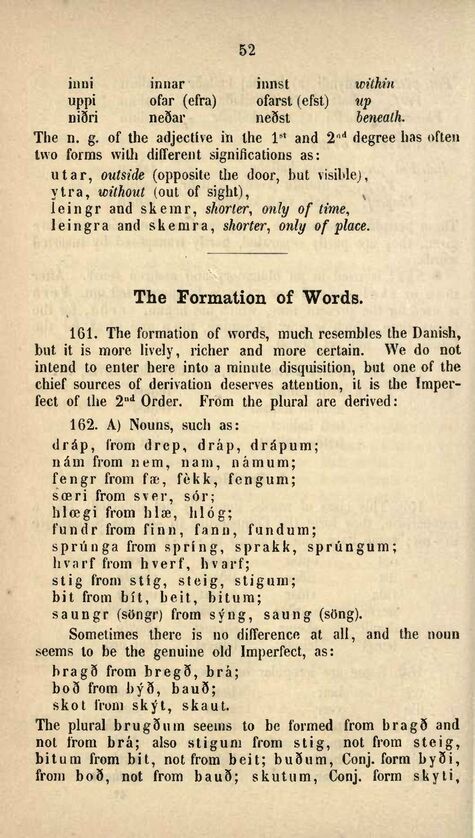
Full resolution (JPEG)
- On this page / på denna sida
- Part I
- Inflection of Words
- V. Particles
- The Formation of Words

<< prev. page << föreg. sida << >> nästa sida >> next page >>
Below is the raw OCR text
from the above scanned image.
Do you see an error? Proofread the page now!
Här nedan syns maskintolkade texten från faksimilbilden ovan.
Ser du något fel? Korrekturläs sidan nu!
This page has been proofread at least once.
(diff)
(history)
Denna sida har korrekturlästs minst en gång.
(skillnad)
(historik)
[[** tabell forts. fra forrige s., ikke tilpasset her **]]
| inni | innar | innst | within |
| uppi | ofar (efra) | ofarst (efst) | up |
| niðri | neðar | neðst | beneath. |
The n. g. of the adjective in the 1st and 2nd degree has often
two forms with different significations as:
utar, outside (opposite the door, but visible),
ytra, without (out of sight),
leingr and skemr, shorter, only of time,
leingra and skemra, shorter, only of place.
*
The Formation of Words.
161. The formation of words, much resembles the Danish,
but it is more lively, richer and more certain. We do not
intend to enter here into a minute disquisition, but one of the
chief sources of derivation deserves attention, it is the
Imperfect of the 2nd Order. From the plural are derived:
162. A) Nouns, such as:
dráp, from drep, dráp, drápum;
nám from nem, nam, námum;
fengr from fæ, fèkk, fengum;
sœri from sver, sór;
hlœgi from hlæ, hlóg;
fundr from finn, fann, fundum;
sprúnga from spring, sprakk, sprúngum;
hvarf from hverf, hvarf;
stig from stíg, steig, stigum;
bit from bít, beit, bitum;
saungr (söngr) from sýng, saung (söng).
Sometimes there is no difference at all, and the noun
seems to be the genuine old Imperfect, as:
bragð from bregð, brá;
boð from býð, bauð;
skot from skýt, skaut.
The plural brugðum seems to be formed from bragð and
not from brá; also stigum from stig, not from steig,
bitum from bit, not from beit; buðum, Conj. form byði,
from boð, not from bauð; skutum, Conj. form skyti,
<< prev. page << föreg. sida << >> nästa sida >> next page >>
Project Runeberg, Mon Dec 11 13:19:06 2023
(aronsson)
(diff)
(history)
(download)
<< Previous
Next >>
https://runeberg.org/oldnorsk/0062.html



